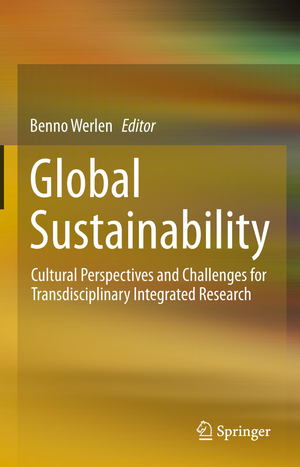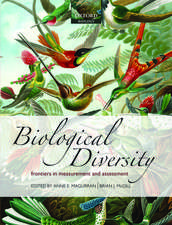Global Sustainability, Cultural Perspectives and Challenges for Transdisciplinary Integrated Research
Editat de Benno Werlenen Limba Engleză Hardback – 10 iun 2015
| Toate formatele și edițiile | Preț | Express |
|---|---|---|
| Paperback (1) | 634.99 lei 38-44 zile | |
| Springer International Publishing – 9 oct 2016 | 634.99 lei 38-44 zile | |
| Hardback (1) | 735.38 lei 6-8 săpt. | |
| Springer International Publishing – 10 iun 2015 | 735.38 lei 6-8 săpt. |
Preț: 735.38 lei
Preț vechi: 896.81 lei
-18% Nou
Puncte Express: 1103
Preț estimativ în valută:
140.73€ • 146.38$ • 116.18£
140.73€ • 146.38$ • 116.18£
Carte tipărită la comandă
Livrare economică 15-29 aprilie
Preluare comenzi: 021 569.72.76
Specificații
ISBN-13: 9783319164762
ISBN-10: 3319164767
Pagini: 315
Ilustrații: XV, 300 p. 48 illus.
Dimensiuni: 155 x 235 x 22 mm
Greutate: 0.67 kg
Ediția:2015
Editura: Springer International Publishing
Colecția Springer
Locul publicării:Cham, Switzerland
ISBN-10: 3319164767
Pagini: 315
Ilustrații: XV, 300 p. 48 illus.
Dimensiuni: 155 x 235 x 22 mm
Greutate: 0.67 kg
Ediția:2015
Editura: Springer International Publishing
Colecția Springer
Locul publicării:Cham, Switzerland
Public țintă
ResearchCuprins
Introduction; Benno Werlen.- Preface: Speech at TIERS Conference in Jena on 8 June 2012; Matthias Machnig.- PART I: INTEGRATED TRANSDISCIPLINARY RESEARCH.- Chapter 1: Sustainability and Territory: An Approach from the Perspective of the Imaginary in Shaping Development; Enrique Aliste.- Chapter 2: Challenges for Transdisciplinary Research; Joske Bunders.- Chapter 3: Narratives for a Sustainable Future. Vision and Motivation for Collective Action; Ilan Chabay.- PART II: KNOWLEDGE.- Chapter 4: Carving a Niche for the Social Sciences in Trans-disciplinary Research on Climate Change Adaptation and Agriculture in Southern Africa; Chipo Plaxedes Mubaya.- Chapter 5: From Co-Production of Knowledge to Transdisciplinary Research. Lessons from the Quest for Producing Socially Robust Knowledge; Juergen Weichselgartner and Bernhard Truffer.- PART III: INTERFACES SOCIETY NATURE.- Chapter 6: Terrestrial Ecosystems Dynamic in the Senegalese Agro-silvopastoral Center-east in the Second Half of the XXe Century; Aliou Dijouf and Matthew G. Hatvany.- Chapter 7: Integrated Global Change Research in West Africa: Flood Vulnerability Studies; Ibidun Adelekan.- Chapter 8: Integrated Approach in Environment Management: Context Bangladesh; Raquib Ahmed.- Chapter 9: Awareness of and Responses to the 2011 Flood Warnings among Vulnerable Communities in Lagos, Nigeria; Olokesusi, F., Olorunfemi, F.B., Onwuemele A. and Oke, M.O.- PART IV: INTERFACES SCIENCE POLICY.- Chapter 10: Solution-Based Spatial Planning for Disaster Risk Reduction and Adaptation to Climate Change in Taiwan; Yu-Fang Lin.- Chapter 11: Institutions and Planning: A Reflection from the Disaster Management Planning in Indonesia; Hendricus A Simarmata and Raka W Suryandaru.- Chapter 12: Could the Search for Sustainability Reinforce the Socio-ecological Conflict? The Mining Industry in Chile and its Impact at the Local and Regional Level; Fernando Campos-Medina.- Chapter 13: Institutions and Planning: AReflection from Disaster Management Planning in Indonesia; Hendricus A. Simarmata and Raka W. Suryandaru.- Chapter 14: Could the Search for Sustainability Reinforce the Socio-ecological Conflict? The Mining Industry in Chile and its Impact at the Local and Regional Level; Fernando Campos-Medina.- Chapter 15: Political decision-making and Scientific Insights. A comment form the Political Arena; Matthias Machnig.
Notă biografică
Prof. Dr. Benno Werlen holds the Chair of Social Geography in the Institute of Geography, Friedrich Schiller University of Jena, Germany. He studied geography, cultural anthropology, sociology and economics at the University of Fribourg (Switzerland) where he received his PhD in 1985 (published in English as ‘Society, Action and Space’, Routledge 1993) from the faculty of philosophy; the habilitation on “Sozialgeographie alltäglicher Regionalisierungen” (Social Geography of Everyday Regionalizations, 2 volumes) was accomplished at the faculty of natural sciences at the University of Zurich. He was a guest researcher at the University of Cambridge/UK, the University of California, Los Angeles (UCLA), and the London School of Economics; was a visiting professor at the universities of Salzburg, Geneva and Nijmegen and is a Panel Member of the ‘European Research Council/Brussels (Environment & Society)’. Since 2004 he holds the chair of the IGU Commission „Cultural Approach in Geography“ and is the initiator and executive director of the IGU initiative for the UN International Year of Global Understanding 2016. Since 2012 he is listed as a key thinker of space and place’ (Sage 2012). His research interests include the relationship between society and environment, the geographies of globalization and everyday regionalizations and the methodology of integrative research.
Textul de pe ultima copertă
This book offers new perspectives of transdisciplinary research, in methodological as well as theoretical respects. It provides insights in the two-fold bio-physical and the socio-cultural global embeddedness of local living conditions on the basis of selected empirical studies from Latin America, Asia, Africa, Australia, and Europe. The theoretical foundations of ecological research and sustainability policies were developed at the end of the nineteenth century. They are largely based on investigations of living spaces, and the evolution and differentiation of varied life forms. This perspective is embedded in the practical and theoretical European problem situations of the past and lacks social and cultural differentiation. The transformation of spatial and natural relations as a result of the globalization process is so radical that new theories are needed to solve 21st century ecological problems. Moreover, in view of the lack of an ontologically sound and promising strategy for transdisciplinary problem solving, as well as an acceptable consideration of the power of cultural schemas relating to natural living’s interpretations, there is a strong need to focus on sustainable social practices, habits, and routines, rather than on predominantly living spaces or eco-topes. This book elaborates on the transdisciplinary approach by reflecting on the theoretical heritage and a global perspective of sustainability, by focusing on the primary role of a social approach in sustainability research, and by putting emphasis on cultural dimension of sustainability. It postulates that global sustainability is grounded in a global understanding of our everyday activities.
Caracteristici
Contains case studies from Latin America, Asia, Africa, Australia and Europe Includes specific teaching material for a wide range of disciplines Presents new forms of integration of the social and natural sciences










